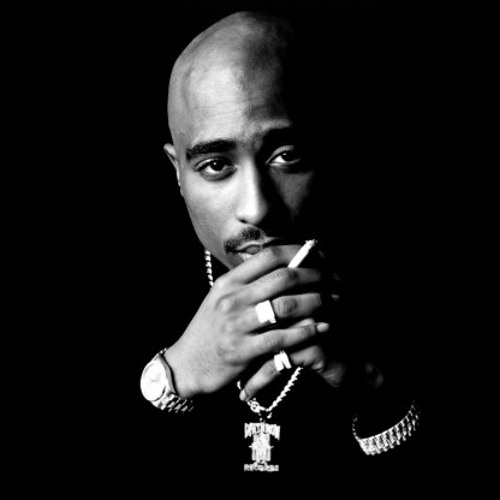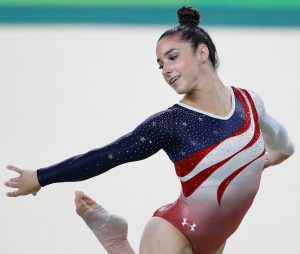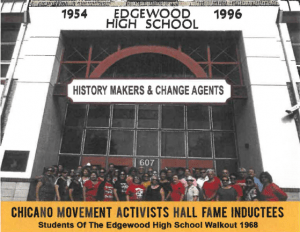Close your eyes and flashback to Harlem, New York in the 1970’s; you hear the unique dialect of thugs, pimps, and prostitutes alongside the upbeat rhythm of culture-rich music. You hear the tension of drug deals, the cries of hungry homeless children out in the cold, and the crackling of the fires of buildings being burnt down and soon to be abandoned. You hear police sirens fill the streets, and the cracking of police batons on the ribs of individuals who plead their innocence. But more importantly, you hear the silent screams of the oppressed on their last straw. Right smack in the middle of this revolutionary explosion, in 1971, was born Lesane Parish Crooks—the future Tupac Amaru Shakur.1

Tupac was born into a family that was deeply rooted in the Black Panther Party. The Black Panthers was a group of African Americans who wore iconic black outfits with black berets and emphasized “black pride.” They fiercely fought for human and civil rights, but more importantly, against police brutality. Although a social movement, they stood out from other movements of that time because, unlike other groups, they used violence to rebel. It was founded by Huey P. Newton and existed through the 1960’s-1970’s.2 His mother, Afeni Shakur, was guilty of 156 counts of crime due to her involvement with the Panther movement, and was in prison while pregnant with Tupac. Although lacking a high school degree, Afeni was incredibly smart. She was known for her public speaking, and when eight months pregnant, she acted as her own lawyer and won the case, getting her released from prison on account of a lack of evidence.3 From early in his life, Tupac lacked a father figure, and it is because of this that he was especially close to his mother and had much respect for her as a single, struggling parent. His godparents, two renowned Black Panther members, Assata Shakur and Elmer “Geronimo” Pratt, had important roles to play in the Panthers organization, so one could only imagine how developed Tupac’s sense of social awareness was from a very young age.
Growing up, Tupac automatically had a love for education. He always had the self-motivation to go to school and the instinct to pursue poetry and drama. Considering his lyrical reputation, it’s no surprise that Tupac was skillfully literate, and he soon began using this talent to say what he felt needed to be said. At fourteen years old, Shakur was enrolled in Baltimore’s School for the Arts, and it was here that he started rapping, his first real rap being about gun control.4 It didn’t take long at all for him to notice flaws in the education system and want to improve it. He later commented on how, after awhile, school became so repetitive that he stopped learning things that are actually important. For example, almost every year from Kindergarten to twelfth grade, children are required to take Math, English, and History courses of some sort, each one not being very different from the last. He felt kids lacked the opportunity to learn “important things,” such as how to complete their taxes, manage finances, and more; things, for example, that revolved around having street smarts and daily practicality. He had no hesitation taking on a leadership role, and took advantage of immediately getting involved. In high school, he started campaigns educating kids about safe sex, in a neighborhood where the rate of AIDS among teenagers was very high. He and some of his friends even wanted to restart the Black Panthers. But instead of the use of violence, his goal was to use his words to get his points across. Tupac particularly emphasized the importance of education, especially among the youth, and the importance of children being raised with the necessary mindset required for bettering the future, not only for themselves but for generations to follow. He also made it known that he absolutely hated racism, deplored the mistreatment of women, and saw both as result of ignorance.5 Tupac had never lived a luxurious life, but unfortunately, he and his family were faced with sudden financial difficulties. His mother had developed a cocaine addiction, due to her involvement with one of her ex-Panther friends. As her addiction worsened, she became unable to hold a job. This caused Tupac’s family to lose the privilege of being able to stay in one place for long. They had to keep moving, from Harlem to Baltimore, then to California, until they were eventually homeless. In 1988, at seventeen years old, Tupac was eventually forced to drop out of school and start selling drugs to pay the bills and support his family.6

Thankfully, a couple years later, in 1990, Tupac joined the HipHop group Digital Underground, and became a background dancer for them. He was also getting roles in movies, such as Ernest Dickerson’s film Juice.7 Tupac was juggling acting as well as rapping, with both really putting his name in the entertainment realm. His rap career really took off in 1991 when his first solo debut album, 2Pacalypse Now, was released.8 In this album, he raps about life in the streets for African Americans, especially in regards to police brutality, poverty, and the war on drugs. It was a real contrast to the stereotypes that rap just contained vulgarity and glamorized delinquent behavior. His frank tone and attitude immediately drew a lot of attention towards these hypersensitive topics, which were otherwise overlooked. Tupac Shakur was giving a new name to Gangsta Rap.9
2Pacalyse Now was arguably the most revolutionary compilation of Tupac’s career, because it sparked such a wide variety of emotions. In this album, not only did he identify problems of the ghetto, but he gave reasoning as to why they persisted, as well as even giving viable solutions, with his most emphasized solution being education. In his song, “Rebel of the Underground,” Shakur states,
“The most dangerous weapon: an educated black man.”10
Also in his 2Pacalypse Now album, in his song “Violent,” he talks about his blunt attitude, and his persistence to expose issues of the ghetto was being confused for violence. In this song, he states,
“They claim I’m violent just because I refuse to be silent…I will rebel against any oppressor and this is known as self defense…Unlock my brain, break the chains of your misery…My words are weapons and I’m steppin to the silent… Wakin up the masses, but you claim I’m violent.”11
Another profound piece on this album was his song “Words of Wisdom,” in which he directly speaks to those who are socially oppressed; more specifically, the African Americans of the lower class. He directly calls out problems regarding drugs, economic inequality among the classes, and how the education of kids in the ghetto is neglected. In this song, he states,
“It’s wrong to keep someone from learning something. I’m fed up, we gotta start teaching children that they can be all that they wanna be. There’s much more to life than just poverty…Conquer the enemy armed with education. Armed with the knowledge of the place we’ve been, no one will ever oppress this race again.”12
By the age of twenty years old, Tupac Shakur was not only changing a whole genre of music as we knew it, but approaching nationwide issues as no one had approached them before. He was changing the way people thought, how they looked at themselves, their place in society, and the importance of things such as education. He was doing all this through his words. Tupac once stated, “I’m not saying I’m going to rule the world or I’m going to change the world, but I guarantee that I will spark the brain that will change the world.”13 Although he died just five years after the release of his first album, his legacy still lives on today in the minds of those who wish to better the lives of the indigent youth. What do you say? Do you have the spark to change the world?
- Michael Dyson, Holler if You Hear Me (New York: Basic Civitas Books, 2001.), 6. ↵
- Encyclopedia of Activism and Social Justice, 2007, s.v. “Black Panther Party,” by Gary L. Anderson and Kathryn G. Herr. ↵
- Encyclopedia of African American History, 2010, s.v. “Shakur, Tupac,” by Aaron D. Sachs. ↵
- Encyclopedia of African American History, 2010, s.v. “Shakur, Tupac,” by Aaron D. Sachs. ↵
- Historic Films Stock Footage Archive, “Tupac Shakur 1988 High School Interview,” YouTube Video, 36:01, June 12, 2017, https://www.youtube.com/watch?v=v_XT9-C5Qu8&t=82s. ↵
- Encyclopedia of African American History 1896 to the Present, 2009, s.v. “Shakur, Tupac,” by Akil Houston. ↵
- Encyclopedia of African American History 1896 to the Present, 2009, s.v. “Shakur, Tupac,” by Akil Houston. ↵
- St. James Encyclopedia of Popular Culture, 2013, s.v. “Shakur, Tupac (1971-1996),” by Pierre-Damien Mvuyekure. ↵
- Simon Glickman, Tupac Amaru Shakur (Detroit: Gale, 2003), 26-27. ↵
- Anton Larson, “2Pac-Rebel of the Underground (lyrics on screen), YouTube Video, 3:11, May 11, 2012, https://www.youtube.com/watch?v=HKF_FZUjts4. ↵
- artfulgooner, “Tupac Violent Lyric Video,” YouTube Video, 6:27, May 6, 2013, https://www.youtube.com/watch?v=EKW3ps02L_o ↵
- 2Pac4ever, “2Pac-Words of Wisdom with lyrics,” YouTube Video, 4:54, January 7, 2016, https://www.youtube.com/watch?v=EsOVlPKyUME ↵
- EducateInspireChangeTV, “I Will Spark The Brain That Will Change The World-Tupac,” YouTube Video, 1:42, September 15, 2014, https://www.youtube.com/watch?v=uijBebYpoto. ↵



96 comments
Elias Garza
I never really listened to Tupac but when I did it was around my older sisters. The song that stood out to me the most was “Changes” because it was catchy and he performed it with passion, as always. I admire how Tupac was able to use everything he experienced in life and turn it all into a form of art.
Robert Rodriguez
Tupac was nonetheless a very educated individual, and in many of his hit songs talked about real issues in society such as in the song “Brendas got a baby”. Many people highlight his thuggish acts and forget just the good he’s done. I like how the author shed the light that Shakur was in fact a black panther. overall this was a really good article!
Cristina Cabello
I really like to listen to Tupac. I just never really knew about his story. I find it really humbling that his songs had genuine messages. Yes it still talked about trash like other rap songs. But the difference is that Tupac wanted to tell the truth about our society. He sparked the minds of children, so that they can help change things.
Cheyanne Redman
I really enjoyed this article, I feel like it shined light onto things that people may not know about Tupac. I remember growing up and learning many different things about Tupac and all the things he did during his life. His music really moved mountains because it wasn’t about the mainstream that everyone wsas on during the time. This article really gave an insight to his life and many facts that the media doesn’t like to show. I had no idea that his mother was apart of the black panther movement and I felt that was a really cool fact for the author to incorporate.
Regina De La Parra
This was an amazing and well-written article! Great job! The article allowed me to understand a lot of who Tupac was and what he represented. I didn’t grow up listening to his songs, but it is really amazing to learn that he was a real artist whose songs were not just made to get money, but to really give out a message of the need for education and other topics. Overall, this was a great reading!! Great job Destiny!
Caroline Bush
Great article! Whenever I think about Tupac I always immediately think about his rap’s so its interesting to see a new side to this famous artist. I really enjoyed learning about how Tupac wanted to make a difference in his community and the struggles he went through to do it. I really enjoyed the details in this article and liked the pictures used. Overall I really enjoyed this article and thought that it was very well researched and detailed.
Jose Figueroa
This article was exceptionally well written! Immediately the introduction really grabs the reader and sets a strong scene for the life of Tupac. I really enjoyed how you went into on how he wanted to fight the injustice of the education system, racism and sexism and included lyrics from your songs to really emphasize those points. Often Tupac is known as one of the few rappers to strongly speak out on social injustices and wish more rappers would do the same sometimes. Excellent job!
Carlos Vazquez
I had Heard about Tupac and his tragic death, but I never knew that his mother was a member of the black panthers. It is crazy that he was able to gain so much fame and notoriety in just five years. I had no idea that his early songs were about the need for better education This article was really entertaining and I enjoyed reading it.
Vanessa Tombo
This article sheds light on the life of Tupac one of the most iconic rappers of all time. Prior to reading this article, I had very little knowledge of how Tupac rose to fame and what his life was. I only knew that he was a rapper and he is very well known for the quality of music he produced and how people were able to relate to the social issues that no one was talking about at the time. This article was very well written which made it very easy for me to be engaged and enlightened about who Tupac actually was aside from just being a rapper.
Belia Camarena
Great job! This is a very informative article, and I love that the author chose to explore a much lesser known side of Tupac. I personally have never listened to any of Tupac’s music, so I was surprised to read that the focus of his songs are on education and social issues. This is very refreshing to hear because he transformed rap music into a tool to promote social change.